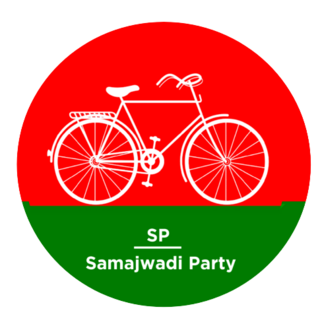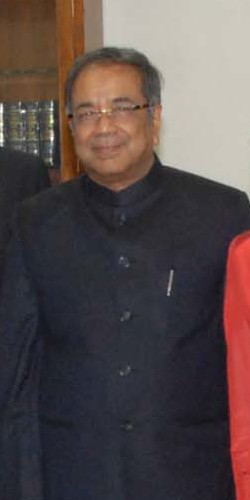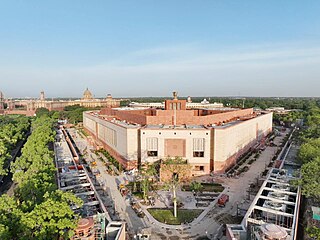
The prime minister of India is the head of government of the Republic of India. Executive authority is vested in the prime minister and his chosen Council of Ministers, despite the president of India being the nominal head of the executive. The prime minister is often the leader of the party or the coalition with a majority in the lower house of the Parliament of India, the Lok Sabha, which is the main legislative body in the Republic of India. The prime minister and their cabinet are at all times responsible to the Lok Sabha.

The Rajya Sabha, constitutionally the Council of States, is the upper house of the bicameral Parliament of India. As of 2023, it has a maximum membership of 250, of which 238 are elected by the legislatures of the states and union territories using single transferable votes through open ballots, while the president can appoint 12 members for their contributions to art, literature, science, and social services. The total allowed capacity is 250 according to article 80 of the Indian Constitution. The current potential seating capacity of the Rajya Sabha is 245, after the Jammu and Kashmir (Reorganisation) Act, 2019, the seats came down to 245. The maximum seats of 250 members can be filled up at the discretion and requirements of the house of Rajya Sabha.

The Lok Sabha, constitutionally the House of the People, is the lower house of India's bicameral Parliament, with the upper house being the Rajya Sabha. Members of the Lok Sabha are elected by an adult universal suffrage and a first-past-the-post system to represent their respective constituencies, and they hold their seats for five years or until the body is dissolved by the President on the advice of the council of ministers. The house meets in the Lok Sabha Chambers of the Parliament House, New Delhi.

The Samajwadi Party is a socialist political party in India. It was founded by formerly Janata Dal politicians Mulayam Singh Yadav and Beni Prasad Verma and is headquartered in New Delhi. The Samajwadi Party is currently led by former Chief Minister of Uttar Pradesh, Akhilesh Yadav after he was chosen as the President at the party's national convention held in 2017.

The Parliament of India is the supreme legislative body of the Republic of India. It is a bicameral legislature composed of the Rajya Sabha and the Lok Sabha. The President of India, in their role as head of the legislature, has full powers to summon and prorogue either house of Parliament or to dissolve the Lok Sabha, but they can exercise these powers only upon the advice of the Prime Minister and their Union Council of Ministers.
The Government of India, also known as the Union Government, the Central Government, or simply the Centre, is the national authority of the Republic of India, a federal democracy located in South Asia, consisting of 28 union states and eight union territories.

The speaker of the Lok Sabha is the presiding officer and the highest authority of the Lok Sabha, the lower house of the Parliament of India. The speaker is elected generally in the first meeting of the Lok Sabha following general elections. Serving for a term of five years, the speaker is chosen from sitting members of the Lok Sabha.

Ganesh Vasudev Mavalankar popularly known as Dadasaheb was an independence activist, the President of the Central Legislative Assembly, then Speaker of the Constituent Assembly of India, and later the first Speaker of the Lok Sabha, the lower house of the Parliament of India. His son Purushottam Mavalankar was later elected to the Lok Sabha twice from Gujarat.

The Deputy Speaker of the Lok Sabha is the second-highest ranking authority of the Lok Sabha, the lower house of the parliament of India. They act as the presiding authority in the event of leave or absence caused by the death or illness of the speaker of the Lok Sabha.As per Article 93 of the Constitution, it says that the House of the People shall, as soon as may be, choose two members to be Speaker and Deputy Speaker so often as the offices become vacant. However, it does not provide a specific time frame. It is parliamentary convention to elect a deputy speaker of the Lok Sabha from a party other than the ruling party to run an accountable democratic parliament.

Sushma Swaraj was an Indian lawyer, politician, and diplomat who served as the Minister of External Affairs of India in the first Narendra Modi government from 2014 to 2019. She was the second person to complete a 5-year term as the Minister of External Affairs, after Jawaharlal Nehru. A senior leader of the Bharatiya Janata Party (BJP), Swaraj was the second woman to hold the office of Minister of External Affairs, after Indira Gandhi. She was elected seven times as a Member of Parliament and three times as a Member of the Legislative Assembly. At the age of 25 in 1977, she became the youngest cabinet minister of the Indian state of Haryana. She also served as 5th Chief Minister of Delhi for a short duration in 1998 and became the first female Chief Minister of Delhi.

The 13th Lok Sabha is the thirteenth session of the Lok Sabha. It was convened after 1999 Indian general election held during September–October 1999.

The 11th Lok Sabha was constituted after April–May 1996 general elections. The result of the election was a hung parliament, which would see three Prime Ministers in two years and force the country back to the polls in 1998. Atal Bihari Vajpayee of Bharatiya Janata Party, the single largest party to win this election, winning 67 more seats than previous 10th Lok Sabha, formed the government which lasted for only 13 days.

The Ministry of Parliamentary Affairs is an Indian government ministry. It is headed by the Union Cabinet Minister of Parliamentary Affairs.

P. D. Thankappan Achary is the former Secretary General of the 14th Lok Sabha and 15th Lok Sabha and Lok Sabha Secretariat, Parliament of India. As Secretary General, he was also the ex-officio administrative head of the Secretariat of the Lok Sabha. The post of Secretary-General is of the rank of the Cabinet Secretary in the Government of India, who is the senior most civil servant to the Indian Government. The incumbent to the post is appointed by the Speaker of Lok Sabha in consultation with the Prime Minister of India and in the Lok Sabha. As per precedence, incumbents to the post of Secretary General have either been senior officers in the Lok Sabha Secretariat or senior civil servants in the Government of India.

T. K. Viswanathan is the Secretary General of the 15th Lok Sabha and Lok Sabha Secretariat, Parliament of India, i.e. the House of the People in the Indian Parliament. As Secretary General, he is also the Administrative head of the Secretariat of the Lok Sabha. The post of Secretary General is of the rank of the Cabinet Secretary in the Government of India, who is the senior most civil servant to the Indian Government. The incumbent to the post is appointed by the Speaker of Lok Sabha in consultation with the Prime Minister of India and the Leader of the Opposition in the Lok Sabha. As per precedence, incumbents to the post of Secretary General have either been senior officers in the Lok Sabha Secretariat or senior civil servants in the Government of India.

Pandit Ram Kishore Shukla was an Indian politician and an activist for Indian independence.

The Appointments Committee of the Cabinet (ACC) appoints several top posts within the Government of India.

The Lok Sabha Secretariat is an independent office of Lok Sabha which functions under advise of the Speaker of Lok Sabha.
The Secretary General of the Rajya Sabha is the administrative head of the Rajya Sabha Secretariat. The secretary general is appointed by the Chairman of Rajya Sabha. In Indian order of precedence, the post of secretary general is of the rank of Cabinet Secretary, who is the senior most bureaucrat in the Government of India.


















